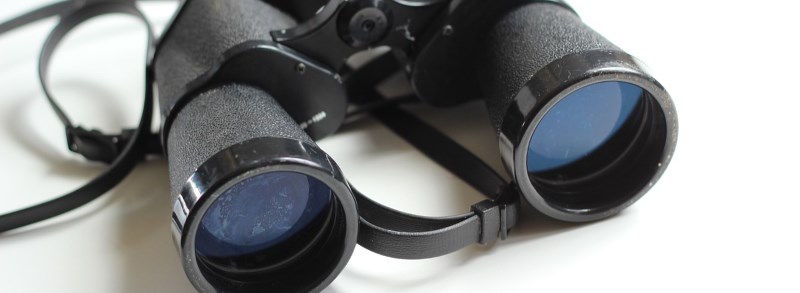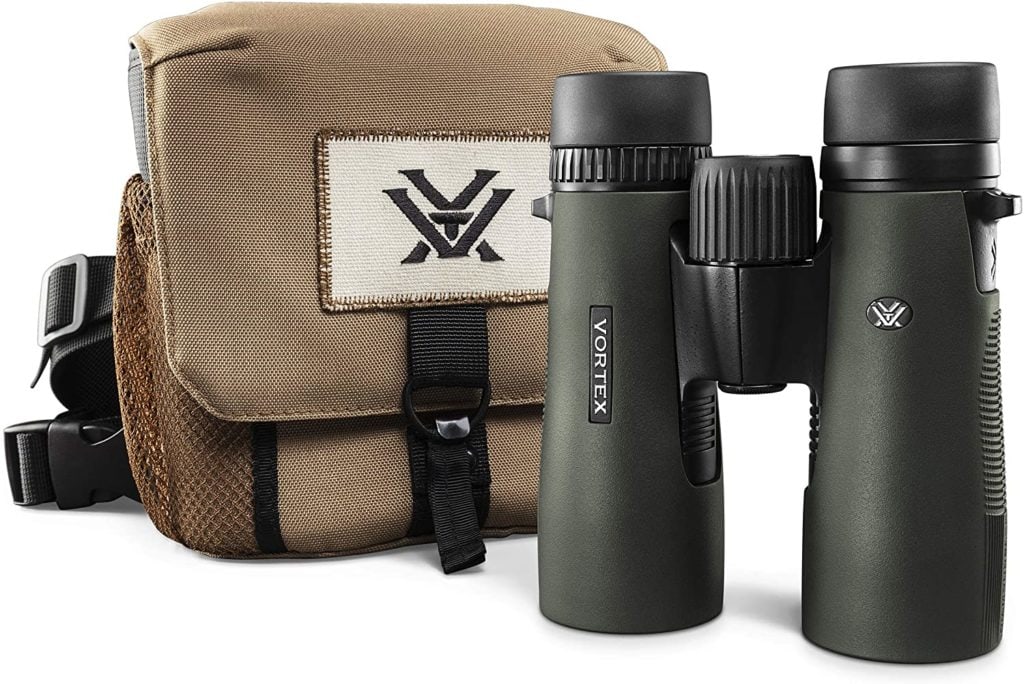How to Clean Your Binoculars: 5 Quick Steps (with Pictures)
Last Updated on

It’s a fact of life, binoculars get dirty. You’re going to take them outside, you’re going to have them in the sun and rain, and dust is going to settle on the lenses. But a good pair of binos can be a big investment. And keeping them properly clean will extend their life and performance.

How to Clean Your Binoculars
So, what’s the right way to clean binoculars to avoid damaging them? Follow these simple steps to ensure you are protecting your binoculars while you clean them.
1. Remove loose dirt

The first step to cleaning your binoculars is to use a blower or soft camel hair brush against the lenses to lift particulates before you do any rubbing. Don’t use your breath to fog the lenses before wiping them, as the moisture will trap dust particles on the glass. You’ll probably want to avoid using compressed air canisters, as well, as the chemicals inside can damage your lens coating.
Pro Tip
Zeiss makes a great, affordable kit that comes with a blower, brush, and lens-safe cleaning solution.
2. Dip a cotton swab in a lens-safe solution and gently moisten the lens, cleaning in a circular motion
Do not use window cleaner or eyeglass cleaners. They are too harsh for the lens coating and will cause damage.
3. Dry your lens with a soft, microfiber lens cloth

Make sure you use this cloth only for the binocular lenses, then store it in a plastic zipper bag to keep it dust-free between cleanings. Never use fibrous cloth such as paper towels, toilet paper, or facial tissue, as they will leave scratch-inducing fibers behind.
4. Clean the body
Use your blower to loosen dust across the binocular body. Then wipe it gently with a damp cloth, using care not to touch your already-clean lenses. Do not use the same cloth you used on your lenses. Your lenses are delicate and need their own cloth to avoid damage.
5. Store them in their case
Most quality binoculars come with a carrying case that will keep them protected and dust-free while they’re not in use. Remember to cap those lenses and store them in a clean, dry place.

Dos & Don'ts of Cleaning Your Binoculars

When to Seek Professional Help
Whatever you do, do not attempt to disassemble your binoculars to clean them inside. You can ruin their waterproofing and fog proofing, but you’ll also nullify any warranty. If you think something inside needs attention, contact the manufacturer. Chances are, they’ll be able to help you with your problem without major surgery. The most important thing to remember is, if you treat your binoculars with care, they can last you a lifetime.
More binoculars-related articles:
- How Do Binoculars Work? Explained
- Which binoculars for under 500 USD are our favorites? See our list here!
- How to Repair Binoculars at Home: Beginner’s Guide
Featured Image Credit: Pixabay
About the Author Robert Sparks
Robert’s obsession with all things optical started early in life, when his optician father would bring home prototypes for Robert to play with. Nowadays, Robert is dedicated to helping others find the right optics for their needs. His hobbies include astronomy, astrophysics, and model building. Originally from Newark, NJ, he resides in Santa Fe, New Mexico, where the nighttime skies are filled with glittering stars.
Related Articles:
How to Collimate Binoculars: 9 Expert Tips
How to Clean a Refractor Telescope: Step-by-Step Guide
How to Clean a Telescope Eyepiece: Step-by-Step Guide
How to Clean a Rifle Scope: 8 Expert Tips
Monocular vs Telescope: Differences Explained (With Pictures)
What Is a Monocular Used For? 8 Common Functions
How to Clean a Telescope Mirror: 8 Expert Tips
Brightfield vs Phase Contrast Microscopy: The Differences Explained
